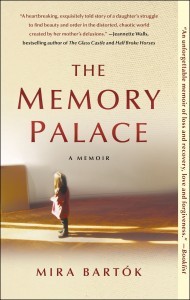Title: The Memory Palace
Author: Mira Bartok
Publisher: Free Press
Publication Date: January 11, 2011
Source: personal purchase
Summary from Goodreads:
When piano prodigy Norma Herr was healthy, she was the most vibrant personality in the room. But as her schizophrenic episodes became more frequent and more dangerous, she withdrew into a world that neither of her daughters could make any sense of. After Norma attacked her, Mira Bartók and her sister changed their names and cut off all contact in order to keep themselves safe. For the next seventeen years Mira’s only contact with her mother was through infrequent letters exchanged through post office boxes, often not even in the same city where she was living.
At the age of forty, Mira suffered a debilitating head injury that left her memories foggy and her ability to make sense of the world around her forever changed. Hoping to reconnect with her past, Mira learned Norma was dying in a hospital, and she and her sister traveled to their mother’s deathbed to reconcile one last time.
Through stunning prose and gorgeous original art, The Memory Palace explores the connections between mother and daughter that cannot be broken no matter how much exists—or is lost—between them.
My Review:
Phew, what a memoir. The Memory Palace is, at various points, sad, frightening, hopeful, and frustrating. But mostly sad. I was sad for the lack of support that Mira and her sister Natalia received over the years, both from their other family members and from social services. I was sad for their mother, who Mira and Natalia loved deeply, but because she was unable to receive adequate help, they were forced to abandon her for their own well-being. And most broadly, I was sad that Mira and Natalia had to live their entire lives under this shadow--because even when they separated themselves completely from their mother, they were still left with horrible memories and a suspicion of others' good will.
This memoir speaks strongly about the lack of social supports for the mentally ill in America. Mira and Natalia tried countless times to get social services involved with their mother, or to appoint her a legal guardian who could take over her financial affairs--and in the end, the vast majority of their attempts failed, resulting in their mother's homelessness and declining physical health. Also, I couldn't believe that Mira and Natalia were never taken from their mother's custody as children. Mira does say that they never wanted that, but from an outsider perspective, it was heart-wrenching to see the fear they lived in throughout their childhoods because of their mother's illness. It makes you wonder how many other families in this country face these obstacles with mentally ill spouses, children, siblings, etc. each day.
Well, I've made it fairly obvious that this memoir leaves a big emotional impact. But I also have to comment on the writing style a bit. I'll admit that, in the beginning, I almost DNF'd this one. The first part of the book, when Mira is recounting her early childhood, took a long time to catch my interest. I think because her memories of this time were so fuzzy (being early in life), she writes about them with a lot of symbolic references to artwork, music, etc and after a while, those references just became too abstract and flowy for me. I wanted to know about her life...I didn't need all of the artistic imagery in its place.
However, as Mira moves into her adolescence and adulthood, she leaves a lot of these fluid images behind, and starts telling her story in a more concrete way. (She does still rely on a lot of artistic images for embellishment--she is an artist, after all--but when paired with the more solid facts of her life, they take on more relevance, in my opinion.) By the time she was recounting her teenage years, I was enveloped in the memoir and found myself captivated by her life story. In spite of the difficult time she has with her mother, Mira has led a truly amazing life, and the journey she goes on around the world is not one you'll soon forget.
Looking for a light read? I think you need to find another book on my blog, perhaps. The Memory Palace is sure to weigh heavily on your mind for a while after reading, but the message it sends about the treatment of the mentally ill makes it well worth your time.









These memoirs dealing with mental illnesses definitely don't tend to be light reads, do they? I read Mind Without a Home by Kristina Morgan as part of its TLC tour, and although I wasn't gung-ho about the book, I was struck by how long she went without a diagnosis, even after going to various doctors.
ReplyYes, it's so sad how the health care system and social services can often fail the people who are struggling with these issues. It's something you don't want to think about and I think it's good that these memoirs force the issue.
I was just reading a post about books that confront you vs books that comfort you and while I like to be intellectually challenged, I almost always avoid books that make you confront emotionally moving social issues. I always like the idea of reading more broadly, so this might be a genre that I try to read more of in the next year. On the other hand, one of the things I love about reading is finding books that leave me feeling happy, so it might just be true that books like this aren't my thing. We'll see :)
ReplyYeah, this one won't necessarily leave you happy. :) But it certainly does fall into the "books that confront" category. I like that idea of confront vs comfort...hmmm...I never thought about which one I read more of! I guess I tend toward the "comforting" ones, but I do intersperse with the confrontational ones, probably at least once a month or so.